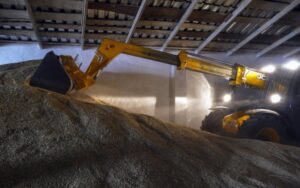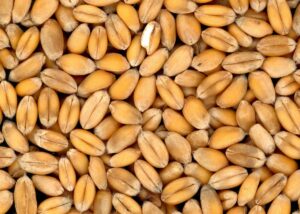
On Sunday, the European Commission called on Poland, Hungary and Slovakia to be constructive after they unilaterally announced that they would extend the ban on grain imports from Ukraine despite the Commission’s decision to end the ban, Reuters reports, citing a European Commission spokesman.
“We are aware of statements by some member states regarding unilateral measures. It is now important that all countries work in a spirit of compromise and engage in constructive cooperation,” the Commission spokeswoman said.
According to her, Brussels is now focused on “putting in place and making work the new system that has just been announced.”
In particular, Reuters reports that a meeting with representatives of all interested EU countries will be held on Monday to discuss the issue of Ukrainian grain imports in more detail.
The news agency notes that Ukraine was one of the world’s leading grain exporters before Russia’s invasion in 2022 reduced its ability to deliver agricultural products to world markets through Black Sea ports. Since then, Ukrainian farmers have relied on grain exports through neighboring countries.
However, the influx of grains and oilseeds to neighboring countries has affected the incomes of local farmers and led governments to ban imports of agricultural products from Ukraine.
As reported, the ban on the export of wheat, barley, rapeseed and sunflower seeds from Ukraine to Poland, Hungary, Slovakia, Romania and Bulgaria, introduced on May 2 for the period until June 5, was extended until September 15.
On Friday, September 15, the EU allowed the ban to be lifted after Ukraine promised to take measures to tighten export controls to neighboring countries.

“DTEK Energo plans to import about 210,000 tons of coal from Poland for more reliable passage of the autumn-winter period by thermal generation, the energy holding company said in a press release on Wednesday.
Under the fuel import contract, an agreement has been reached on the supply of thermal coal throughout the heating season, starting from September 2023 and until March 2024.
As the company noted, the first coal shipments are expected as early as this week.
“In the conditions of war, unpredictable actions of the enemy and the increased load that the company’s thermal power plants have been carrying in recent months, additional volumes of imported fuel will allow to “back up” and provide an additional margin of safety for a more stable passage of the nearest heating season by thermal generation,” said Ildar Saleev, CEO of DTEK Energo, quoted in the press release.
As reported, DTEK Energy’s thermal power plants have increased their electricity output by 28% over the last four months compared to the same period last year. In turn, in August, when consumption was at record highs for the summer due to the heat wave, power engineers generated 35% more electricity than in August 2022.
In just eight months of this year, DTEK Energy’s thermal power plants supplied almost 9.9 bln kWh of electricity, which is equivalent to the average consumption of about 3.3 mln households during the year.

Poland will not allow grain imports from Ukraine after September 15, as the interest of Polish farmers is more important to the country’s government than any EU rules on this issue, said Polish Minister of Agriculture and Rural Development Robert Telusz.
“We know what could have happened if grain (from Ukraine) had arrived in Poland after September 15. Especially since the price of grain is currently low, and the granaries are already full. We know that this is in our interest and we will defend it. That is why I am going to Spain with this message to the summit of agriculture ministers,” the Polish publication farmer.pl quoted him as saying during the National Agricultural Exhibition in Czestochowa last Sunday.
Telusz informed the public that on Monday he will visit Spain, where he will convince the European Union to extend the ban on grain imports from Ukraine to the EU until the end of 2023 after September 15, together with representatives of other frontline countries – Hungary, Bulgaria, Slovakia, and Romania.
“When the war in Ukraine broke out, Polish society, including farmers, became the saviors of the Ukrainian cause. (…) Polish society became a lifesaver. Today in Brussels, we are loudly declaring: a dead rescuer is a bad rescuer. We will not allow the Polish farmer to lose because of arbitrary decisions of officials from Brussels,” said Deputy Minister of Agriculture Krzysztof Ciezora.
According to Janusz Kowalski, the State Secretary of the Ministry of Agriculture, the Polish government has supported Polish farmers to the tune of EUR 3.181 billion, while the amount of financial support from the European Commission is only EUR 63.614 million.

Metinvest mining and metallurgical group will invest in a logistics center in Poland in order to increase the supply of Ukrainian metal products for export, the company’s CEO Yuriy Ryzhenkov said in an interview with the leading Polish business publication Business Insider.
According to him, Zaporizhstal and Kamet Steel are currently operating at 65-70% and 75% of their capacity, respectively. About 25% of products are sold on the domestic market, the rest goes mainly to the EU. At the same time, steel is sold mainly in neighboring countries, such as Poland, Slovakia, the Czech Republic, Romania, and Bulgaria.
The company also sells metal products to Italy, Germany or France.
“Steel mills can hardly complain about the low level of sales, but iron ore enterprises were less fortunate. Here, in addition to domestic consumption, China was also a buyer. However, in the current situation, exports there are practically impossible, since the Black Sea ports are blocked, therefore, the border countries of the EU also remain buyers here. Iron ore enterprises now use about 35-40% of their capacity. We tried to send raw materials to China through Romanian and Polish ports. However, unfortunately, the economy of this logistics simply does not work in the current market,” the top manager said.
He noted that at the same time, the coal production of the company in Ukraine operates at 100% capacity. The mined coal is supplied to the group’s coking enterprises in Ukraine, and is also sold on the local market. The rest is sold abroad, mainly in Slovakia and Poland.
“In 2022, our steel production decreased by 69% compared to last year. This affected a number of financial indicators. For example, our profit in 2022 is 54% less than last year,” the CEO said.
He also stated that Metinvest’s strategy has not changed – the company wanted to connect Ukraine and Ukrainian iron ore with the European steel production chain. Therefore, the group continues to look for opportunities to acquire assets that would allow it to use the Ukrainian raw material base, produce products in the EU and supply them to European consumers.

Data from local authorities show that seven people have died and 113 hospitalized in Polish Rzeszów, which is about 100 km from the border with Ukraine, due to legionellosis (Legionnaires’ disease), Bloomberg reports.
Authorities in Rzeszów are conducting tests to find out the source of the outbreak, with results expected on Monday, regional government head Ewa Leniart told Poland’s RMF radio.
She said the contamination is believed to be caused by water in the water supply system and the situation is under control.
At the same time, it is pointed out that Poland’s Internal Security Agency (ABW) is checking whether the outbreak of legionellosis in Rzeszów could have been a sabotage, given the city’s role as a transit center for supplies to Ukraine. Such actions are aimed at ruling out any external influences that could lead to the spread of the disease, Poland’s deputy minister-coordinator of special services Stanislaw Jarin said on Twitter.
Legionellosis (Legionnaires’ disease) is an acute infectious disease caused by various types of microorganisms, which affects lung tissues and is characterized by the development of a severe form of pneumonia. According to the OIE, the most common form of transmission is inhalation of infected water splashes.